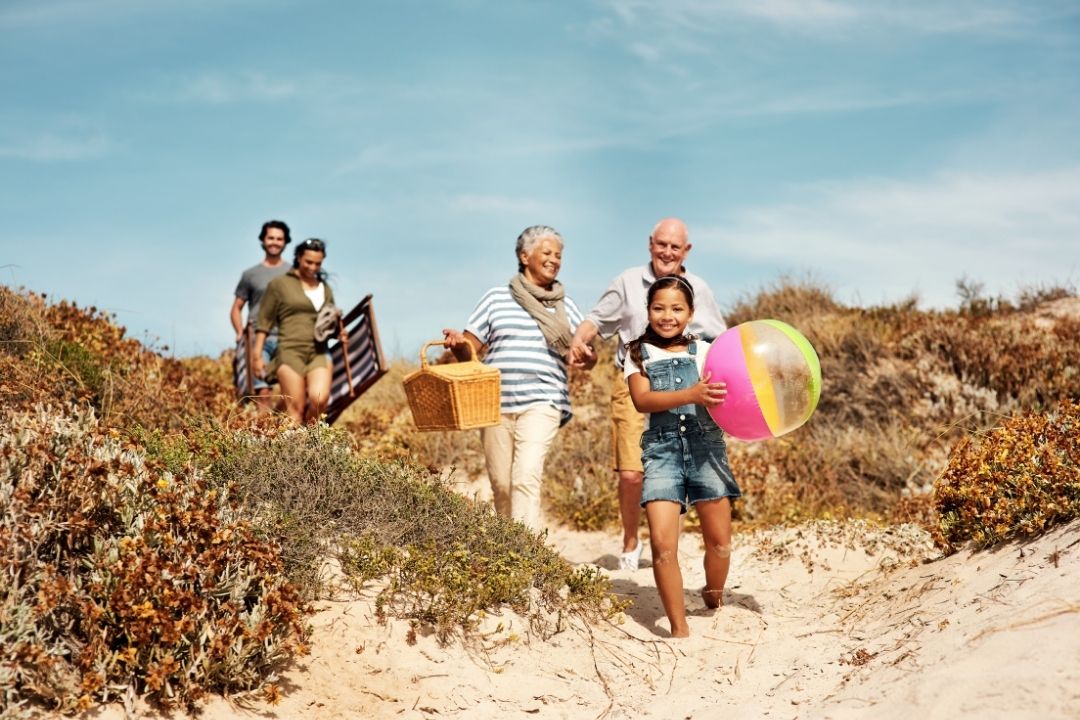Far more than previous generations, current parents — largely millennials but also some Gen X- and Z-ers creeping in there too — are taking multigenerational vacations, complete with kids and grandparents along for the ride. On the surface, it looks like a win-win, with parents (hopefully) getting some vacation child care out of Grandma, while grandparents supposedly soak up more quality time with grandkids. But how helpful is it to have such an unwieldy travel group — and is everyone just overwhelmed? Here’s what travelers of any generation should know about planning a big family vacation — and pulling it off with fewer risks, more rewards and everyone’s mental health intact.
The multigenerational travel trend
For plenty of families, like Dr. Sherry Katz-Bearnot’s, multigenerational travel had been a tradition for decades. “Even when our kids were little, we traveled with my parents,” Katz-Bearnot, a psychiatrist, mother of three and grandmother of two tells Yahoo Life of her vacations in the 1980s and ’90s. “We went to Colonial Williamsburg with the kids and my parents, and they loved it.” Thirtysomething years later, she’s recently returned from a successful trip to Europe with her grown kids and her grandchildren. And these days, more families than ever are hopping on the bandwagon.

The most popular multi-gen destinations? “Easy” bucket-list trips like Hawaii (a long haul to another world without the hassle of a passport) and backroads adventures with different levels of activity available.
The benefits of multigenerational travel
Clinical psychologist Melinda Blitzer reminds millennial parents that “even if you didn’t have the best relationship with your parents growing up, there can be some healing in your relationship by observing your parents with your children [and] being loving towards them.” Blitzer adds, “There’s research about this actually, that grandparents tend to have a more positive relationship with their grandkids than their own children, because their feelings of responsibility and the tensions are diluted.” That said, this does not apply for individuals and families with a history of abuse or trauma.
The potential pitfalls
Despite the joys of free child care and cross-generational bonding, a family vacation with so many people is bound to have its problems. Blitzer says there’s a “certain kind of regression that happens” when some people spend time with their family of origin, particularly for adult children in close quarters with their parents. She explains, “Old ways of being that are no longer adaptive might surface. It can make negotiating tension or conflict or advocating for your needs a little more complicated.”
Blitzer worked with a young mother who planned a trip to Italy with her husband, their 2-year-old and her own parents. She was completely overwhelmed with anxiety before the trip, plagued with worries about how her child would behave on the plane and whether her parents would help. Those worries proved to be unfounded, and instead the mother was surprised to find herself feeling envious when her parents did indeed help out — and that her toddler kept gravitating toward grandpa instead of her.
But remember: You don’t have to do this. It doesn’t matter if it truly is your parents’ 50th anniversary wish; if simply planning the trip is causing you anxiety, or putting pressures on your partnership, you can skip the trip entirely. Plan a vacation with a smaller group, or just stay home this round.
How to make a multigenerational vacation work
The through lines of everyone’s experiences were: Set realistic expectations ahead of time, slow down, build in alone time, advocate for your needs and keep communicating — and maybe try to keep a sense of humor.
Set realistic expectations, and do it ahead of time
Don’t overextend. Do build in alone time.
For grandparents many years out from their own little-kid parenting phase, returning to constant contact with small and antsy humans may come as a bit of a shock to the system.
And know when to just laugh
That holds true whether you’re traveling solo, with a partner or with 16 of your closest family members on the multigenerational trip of a lifetime. For all of these scenarios, Katz-Bearnot’s best piece of advice — and that of many seasoned travelers — is to shrug off what doesn’t really matter.
